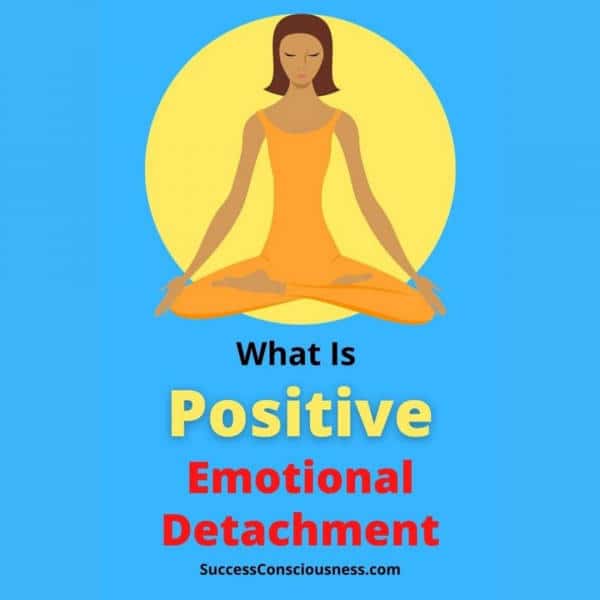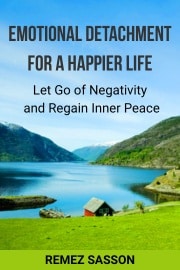
What is emotional detachment? How to define detachment?
You might have never heard about it, and if you did, it is most probably that you have heard about its negative phase.
In its negative phase, it can mean a lack of empathy, repression of emotions, and estrangement. I am not talking about this kind of emotional detachment.
I am not talking about the inability to express emotion or about the negative symptoms of emotional detachment.
I am talking here about experiencing detachment in its positive aspect. It is a positive quality that is very helpful in many situations. It can save you a lot of suffering, stress, and emotional upset.
I am referring to positive emotional detachment with a positive aspect.

What Is Emotional Detachment?
What is the definition of the word ‘detached’? Let’s define detachment and talk about its positive meaning.
Positive Detachment Definition
It is a state of inner calmness and poise and the ability not to let what people say or do agitate you emotionally and disturb your state of mind.
Imagine opening your inbox every week to find a gentle nudge—practical, uplifting guidance to help you pause, breathe, and respond with calmness. Facing Everyday Challenges with Calm is a weekly newsletter with lessons to help you stay grounded and strong, even when life is hectic.
👉 Start Your Calm Journey Today
This skill, and it is a skill, helps you keep your poise in difficult situations and enables you to avoid dwelling in the past and occupying your mind with negative thoughts.
It is a skill that can help you keep your mental and emotional poise and balance and avoid taking things too personally.
Positive emotional detachment is not a state of indifference or passivity and does not mean a lack of interest or feelings.
True detachment is something else. It is an attitude of open-mindedness and of being practical.
You can be loving, caring, and interested in people and yet keep a certain measure of detachment. This would protect you from becoming too attached for your own good or emotionally drained by negative people.
People who possess detachment keep their poise when they run into problems or trouble. They accept the good and the bad equally because their minds are in a state of inner balance and peace. They do not get upset if their plans do not turn out as expected. They try again or look for a new approach.
If they succeed, they are happy, and if they don’t, they will either try again or forget the matter and move on to something else.
Each week, you will receive a new lesson with guidance, actionable tips, and exercises to help you step beyond the daily, ordinary life, expand your consciousness, and cultivate a life of mindfulness, inner peace, and self-awareness.
👉Transform Your life with the Inner Awakening Weekly Lessons
It is always good to be, to a certain degree, an emotionally detached person. This will save you a lot of emotional burden, manipulation, and unpleasant feelings. However, this should be accompanied by common sense, thinking, and not going to extremes.

Live happier by mastering emotional detachment.
The Emotional Detachment GuideClarification about Positive Emotional Detachment
- It is not emotional numbing – It is a state of calmness.
- It does not make you shun relationships.
- There is no lack of emotions. You simply avoid negative and disturbing emotions.
- It does not make you avoid emotional connection.
- It is the ability to stay calm and relaxed when in the company of stressful people and stressful situations.
- It’s a mindset that avoids impulsive, emotional responses and unpleasant emotional attachment.
- It has nothing to do with the inability to connect, personality disorders, or mental health conditions.
- It is a skill that makes you feel emotionally calm, relaxed, and happy.
Additional information about emotional attachment.
The possession of this skill makes a person avoid stress, take care of their mental health, and keep healthier emotional connections. This affects personal relationships, day-to-day activities, and all aspects of life in a positive way.
- Do you allow other people’s moods to affect your state of mind?
- Do you allow other people’s frustration, anger, or emotions to affect you?
- How many times have you got emotionally involved with something against your will and better judgment?
- Do you get angry, frustrated, or disappointed by trivial matters?
- Do you allow external matters to affect your state of mind and your feelings?
If you do, you need to develop a certain degree of detachment.
When it comes to personal matters and to matters that involve the emotions, it is hard to avoid getting affected and emotionally involved.
It is difficult to stay calm when people criticize you or disrespect you. It is also difficult to remain calm when people speak about their problems or share their anxiety, stress, or negative feelings with you.
However, with some training, you can teach yourself to stay calm, positive, and affected by negative words, feelings, or situations.
This attitude is most useful in daily life, at work, pursuing ambitions and careers, and, of course, on self-improvement and spiritual paths.

Live happier by mastering emotional detachment.
The Emotional Detachment GuideSituations that Require Emotional Detachment
How do you feel when somebody says something nasty or makes an unpleasant comment? You would probably become angry, unhappy, or feel hurt. This happens because you let other people’s thoughts, words, and actions affect your state of mind, your actions, and your reactions.
On the other hand, if you are able to stay detached, you will not be upset and disturbed. You will stay calm and will not waste hours thinking about their words.
- Do you spend hours thinking about hurts, bad memories, and failure instead of finding ways to avoid these feelings?
- Do you allow yourself to be pulled into emotional thinking, worries, and fears instead of detaching yourself from them?
- How much time and energy do you waste every day brooding on useless thoughts and feelings due to lack of detachment? Much of the anger, frustration, unhappiness, and disappointments are due to a lack of detachment.
- While working, reading, walking, and during other activities, we often keep thinking about people and situations that have hurt us. This is not a useful activity and is a waste of time and energy.
- Do you practice meditation? During meditation, an endless number of thoughts keep coming into the mind, attracting the attention and awakening associated thoughts and emotions. This makes you forget the meditation and follow your thoughts. However, if you can display detachment toward your thoughts, it would be easier to ignore them.
You can prevent yourself from getting involved in these situations and being affected by them when you develop the ability to detach yourself from them. This is emotional detachment. It is a way to protect your mental and emotional well-being.
- It is a most useful skill when driving since it helps you stay calm when you find yourself in a traffic jam and when someone cuts your lane.
- It is useful when someone criticizes you or treats you rudely. It helps you keep your composure and control your reactions in these situations.
- It also helps you avoid resentment and holding grudges because you rise above these feelings.
These are just a few of the many situations where emotional detachment can be of great use. Remember, I am referring to its positive phase, where it is useful and can save you time and energy.
Additional Definitions and Meanings of Detachment
Emotional detachment means letting go, to let go of negative feelings, thoughts, and memories. It means letting go of anger and resentment and forgetting your frustrations, disappointments, and failures.
In simple words, it means freedom from attachment to anything that harms and hurts you. It means adopting a calm, happy, and balanced state of mind. You are not repressing anything or hurting anyone when expressing this skill in the right, positive way.
When you possess this skill, you are in a better position to help or advise people because you become a calm and relaxed person, use your common sense and reason, and do not respond and react with anger.
You can develop this helpful skill with simple training. In my book about this topic, I offer guidance and advice for developing this valuable skill, which anyone can follow and practice.
The information on this page does not replace medical advice, diagnosis, or treatment by mental health professionals.

Live happier by mastering emotional detachment.
The Emotional Detachment Guide
 Founder of SuccessConsciousness.com,
Founder of SuccessConsciousness.com,